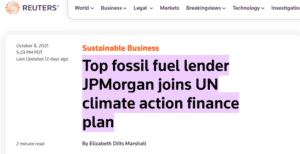With less than two weeks until the start of the Glasgow Climate Talks, Stop the Money Pipeline is preparing to turn up the heat on banks during the youth-led October 29th Fossil Free Future day of action. Though the banks will never admit it, years of pressure has pushed a number of major Canadian and U.S. banks to agree this month to new climate commitments. But what do the new commitments mean, and will they actually help prevent the most catastrophic impacts of climate change and human rights abuses? Did a French public bank really just commit to ending financing for oil and gas?


“Top fossil fuel lender JPMorgan joins UN climate action finance plan” read a headline from Reuters on October 8, 2021, when JP Morgan Chase announced it was joining the United Nation’s Net-Zero Banking Alliance (NZBA). Such a headline was unimaginable just a few years ago. But thanks to pressure from grassroots groups all across the globe and the work of Stop the Money Pipeline member organizations, the media is finally highlighting the truth–that banks like JP Morgan still remain stubbornly in support of the incumbent fossil fuel industry despite their lip service to climate action.
JP Morgan Chase has long spoken out of both sides of its mouth, announcing support for the Paris Agreement and saying it will commit $2.5 trillion to clean energy and sustainable financing over the next decade, while CEO Jamie Dimon has said they would keep lending to oil and gas “for a long time.” That’s the entire concept of Net-Zero. A corporation can “offset” it’s sinful fossil fuel business with penance through dubious schemes like carbon offsets, carbon capture and sequestration, and biofuels. That’s partly why, last week, JP Morgan Chase, Wells Fargo, and six major Canadian banks finally joined 53 other major financial institutions, like Bank of America and Citibank, in the Net-Zero Banking Alliance. The NZBA is part of the umbrella group, Glasgow Financial Alliance for Net Zero (GFANZ) chaired by former Bank of England Governor Mark Carney, now the UN Special Envoy on Climate Action and Finance.
WOAH @AOC asks US bank CEOs if any of them have set targets for reducing financing of carbon emissions, in absolute terms.
Either Jamie Dimon misspoke or JP Morgan is actually getting off their greenwashing kick. Listen 👇🏽 pic.twitter.com/YFA2rJiIdU
— Stop the Money Pipeline (@StopMoneyPipe) May 27, 2021
The Stop the Money Pipeline coalition saw these commitments coming from a mile away. That’s why we hosted a Greenwash press briefing with Congresswoman Katie Porter (watch the recording on Youtube) in late September–to prepare the media for accurate reporting on the coming climate policy commitments ahead of the COP26 climate talks in Glasgow. In the press briefing, Paddy McCully, Energy Transition Analyst at Reclaim Finance (30:42 minute mark) explained that any financial institution in the NZBA has 18 months to come up with 2030 targets. That should mean the newest members to the NZBA have until April 2023 to come up with plans to halve their financed emissions by 2030. However, the NZBA framework has some serious loopholes that look more like greenwashing than any serious commitments to align their business activities with what the International Energy Association and the Paris Agreement call for: an end to investments in all fossil fuels.
Loopholes in the Net Zero Banking Alliance framework
Below is a short explanation of loopholes in the NZBA framework, drawn heavily from the STMP Greenwash Press Briefing Summary written by our partners at Reclaim Finance and Rainforest Action Network.
- Covers lending, not underwriting of bonds. In addition to making giant loans to corporations and individuals, banks underwrite bonds. With each bond a bank underwrites for a fossil fuel company, it is validating the supposed low risk of that fossil fuel company, vetting the company for investors.
- In the STMP Greenwash press briefing, Paddy McCully of Reclaim Finance notes that in September 2021, NZBA founding members Citibank and Bank of America underwrote a bond for Russia’s biggest coal miner, which has plans for increases in coal output. And in May, Citi underwrote a bond for the operator of one of Australia’s largest coal export terminals. Both of these activities are completely incompatible with the Paris Agreement yet are apparently permissible within the Net Zero Banking Alliance.
- Allows members to set targets only in terms of dubious emissions intensity metrics, rather than absolute emissions. By using carbon intensity as a metric, NZBA members can say they have reduced the emissions per dollar of financing or emissions per barrel of oil produced. If it doesn’t sound like reducing emissions, that’s because it’s not! Financial institutions can meet their carbon intensity targets and still increase emissions in absolute terms. This is exactly what JP Morgan Chase committed to in May 2021. According to Rainforest Action Network:
- “Exxon, for example — JPMorgan Chase’s number 2 fossil client since Paris, with $7.5 billion in financing just last year — already plans a reduction in intensity that exceeds what JPMorgan Chase is calling for, as well as the second-most new oil and gas extraction of any company in the world.”
- Contains no mechanisms to hold their members accountable to their commitments. Members are supposed to voluntarily publish targets and commit to meeting them, but there do not appear to be any consequences for not doing so (see Greenwash Press Briefing summary)
If JP Morgan Chase can keep Exxon as a top fossil client under the NZBA, what does net-zero even mean?
A French public bank commits to ending fossil fuels by 2030
On October 14, 2021, Reuters reported that French public bank Banque Postale committed to stop providing services to the oil and gas sectors by 2030. According to the bank, services include loans and payment solutions to companies in the oil and gas development sector. Their press release reads that it is “one of the first financial institutions worldwide to be validated by the Science Based Targets initiative.” It says it is committed to “achieving science-based targets for 85% of its loan and investment portfolio by 2030 (mortgages, commercial real estate, energy project financing, equities, bonds and long-term loans to businesses).”
Banque Postal’s policy is the quintessential opposite of Chase’s recent announcement. By phasing out the bank’s support of the fossil fuel industry, it directly addresses the bank’s role in causing climate change. By comparison, Chase’s policy allows for the bank to continue to lend evermore money to the fossil fuel industry and therefore do nothing to address the climate crisis. What we really need is banks like Chase to look closely at Banque Postal’s policy and to follow their lead. For as the campaign organizations, Reclaim Finance, Friends of the Earth France and Oxfam France said in their response to Banque Postal’s new policy,”If all banks were to copy and paste La Banque Postale’s policy, the climate would be largely spared.” We couldn’t agree more.

